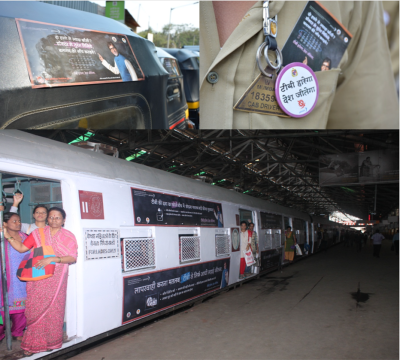In this post, guest contributor Aasit G. Nanavati—Chief Strategy Officer of the software company DevResults—discusses the importance of human-centered approaches to innovation, and of collaborations among government, nonprofits, and the private sector, to meaningfully improve people’s lives and experience. Although he is not himself a graduate of the MHCI, his professional journey reflects the value of the core competencies that students learn in the MHCI, including:
-
Analytical thinking
-
Complex problem-solving
-
Communication ability
-
Social influence
-
Leadership
Read on to see the impact that those skills can have on improving public health in international settings.
From a young age, I understood the necessity of public health, witnessing firsthand the challenges people faced across the world, from the farmlands of Panama to the urban slums of Mumbai. And in my career, I have been afforded a unique perspective on how various stakeholders—including governments, nonprofits, and the private sector—can collaborate to foster an ecosystem aimed at driving impactful innovation. Like innovation itself, my journey has not been about reinventing the wheel. It has been about transforming people’s experiences for the better with a focus on sustainability. And it has increasingly centered around the idea that the core of innovation resides in enhancing people’s lives by transforming how they interact with essential services.

After graduating from Temple University’s Master of Public Health with a robust academic foundation, I embarked on a career dedicated to epidemiology and global health. My initial roles in Philadelphia and Mumbai highlighted the importance of collecting and leveraging data, as well as opportunities to use technology—combined with those insights—as a vehicle for social impact.
Working with the Philadelphia Department of Public Health during the H1N1 influenza pandemic in 2009, I used data-driven decision making to enhance management of a public health crisis by focusing efforts on identifying, monitoring, and advocating for practices that decreased the spread of illness.
While in Dharavi—an area of Mumbai, India that is home to one of Asia’s largest slum populations—my work on the prevention of violence against women and children revealed how using technology to develop systematic processes for data-informed decision making can accelerate advancement in social impact. There, we used digital tools to better interpret years of paper-based records and uncovered patterns in our findings that could be addressed through data-informed strategic planning.
Working in partnership with governments cemented these insights and highlighted the need for coalition building to drive change.
In Uganda, together with USAID and the Ugandan Ministry of Health, I helped strengthen data collection and established real-time analytics and online dashboards in order to find and implement best practices for HIV and TB awareness and treatment specific to local populations. Using the Lot Quality Assurance Sampling (LQAS) methodology and disseminating findings in person across the nation, we highlighted what was working and what areas of programmatic implementation still needed improvement to reduce infection rates nationwide.
Meanwhile, back in India, I partnered with the municipal government of Mumbai to launch a large-scale tuberculosis awareness campaign. The campaign, called “TB Harega, Desh Jeetega,” was successful in no small part because of the coalition behind it. Not only was it a partnership between government and nonprofits, but among philanthropists, private stakeholders, broadcast media, and Bollywood. Those partnerships drove the spread of the campaign through deceptively simple technologies, including a TV ad, a movie trailer, and even painting an entire local train in Mumbai.
Together, this experience led me into the private sector, with the goal of innovating to produce scalable, human-centered solutions to global challenges.
In 2017, I joined DevResults, a company designing software specifically for results-based data management for foreign aid organizations. First as the Director of Strategy and Partnerships, and now as Chief Strategy Officer, my work in NGOs—in partnership with governments around the world—has informed a commitment to producing intuitive, purpose-built technology tools that leverage data to solve complex problems.
In my journey so far, I have learned that innovation is not merely technological advancement. It is the ability to use technology—foundational and emerging—to sustainably transform people’s experiences. For instance, while DevResults offers a software solution, the software is a tool; the innovation is in how users implement programs. The purpose of the software is its impact—changing how organizations manage and utilize data for better outcomes.
My range of experience highlights some of the ways that innovation can and should enhance the efficacy and usability of essential services as a first priority. Where my projects have succeeded, they have been about understanding human needs to craft better solutions. Technology-driven or not, those solutions must be effective, sustainable, and easy to adopt.
As I continue to teach at the Elliott School for International Affairs at George Washington University and serve on the Council on Foreign Relations, I maintain my commitment to thoughtful innovation. Innovation is not one discrete project. It is about creating a ripple effect that transforms the foundational elements of how services are delivered and experienced. Whether you are a public servant working on health communication through better data or an entrepreneur enhancing accessibility to resources like food, the goal remains the same: to meaningfully improve real people’s lives.
Aasit G. Nanavati is an epidemiologist by training with over 15 years of experience using technology to advance foreign policy across the global development and humanitarian aid sectors. Currently, he is Chief Strategy Officer at DevResults and an adjunct professor of Digital Development at George Washington University. In 2024, he was elected as a Stephen M. Kellen Term Member at the Council on Foreign Affairs.

